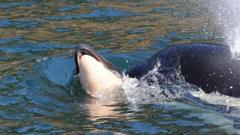In a poignant reminder of the emotional intelligence of marine life, the killer whale known as Tahlequah has been sighted off the coast of Washington, once again engaging in a heartbreaking act of mourning. The Center for Whale Research confirms that this grieving whale has lost another calf, echoing the tragic events of 2018 when she gained widespread media attention for carrying her deceased newborn for an extraordinary 17 days.
This time, Tahlequah is navigating the waters of the Pacific Northwest with her deceased calf, reminding observers of the profound bonds and emotional experiences present in the lives of these majestic creatures. The Center states that while the loss of any calf is a severe impact, the latest death is especially devastating, considering the whale's difficult history.
Tahlequah, part of the critically endangered Southern Resident killer whale population, has now lost two out of her four documented calves, with both losses being female. This alarming trend emphasizes the precarious existence of the Southern Resident population, which is listed as endangered in both Canada and the United States.
Both countries recognize that these whales face significant threats tied to their primary food source—Chinook salmon. The salmon population has seen a dramatic decline in recent years, directly affecting the whales' nutrition and ability to reproduce. Research from the University of Washington highlights a connection between the availability of this crucial food source and the whales’ reproductive success.
As we witness Tahlequah's heart-wrenching display of grief, it is essential to reflect on the broader ecological challenges faced by this species. The 2018 incident occurred when she was off the shores of Victoria, British Columbia, where she made global headlines for her enduring display of maternal love. Now, her recent actions continue to resonate, shedding light on the plight of an endangered population struggling against both environmental changes and the impacts of human activity.




















